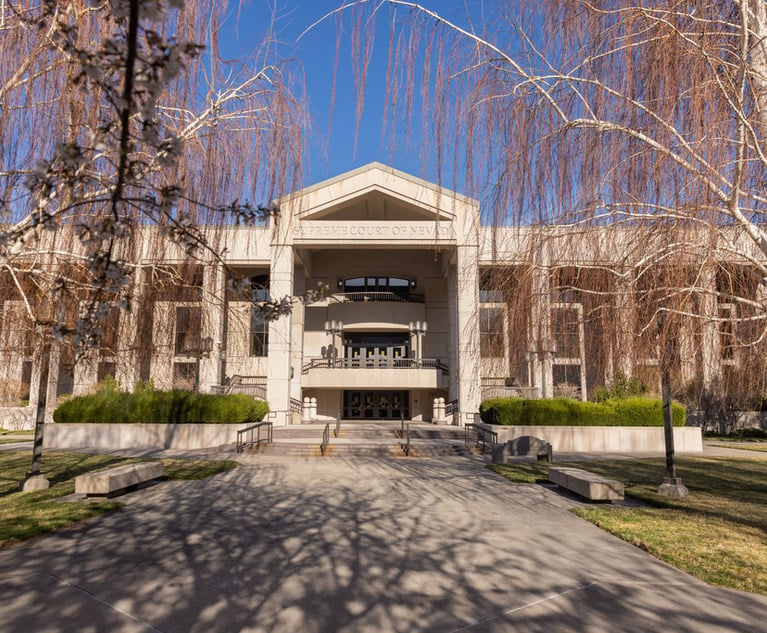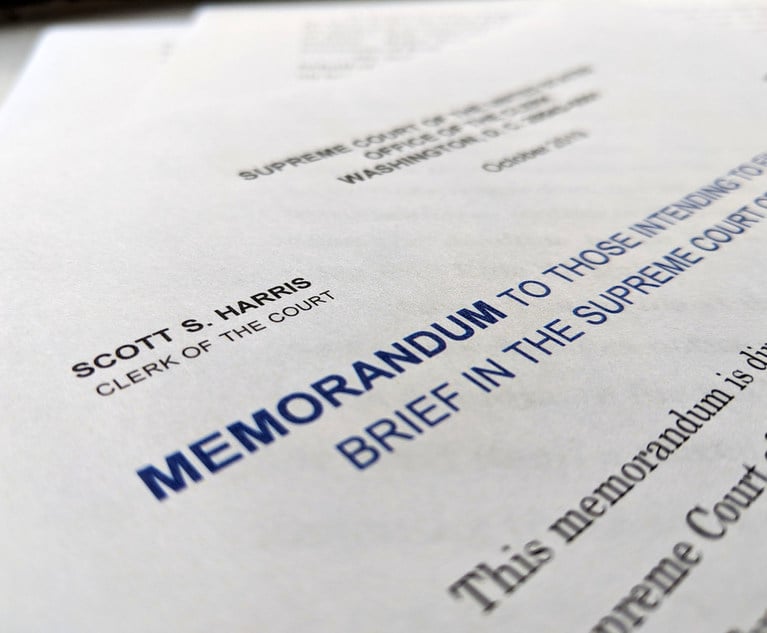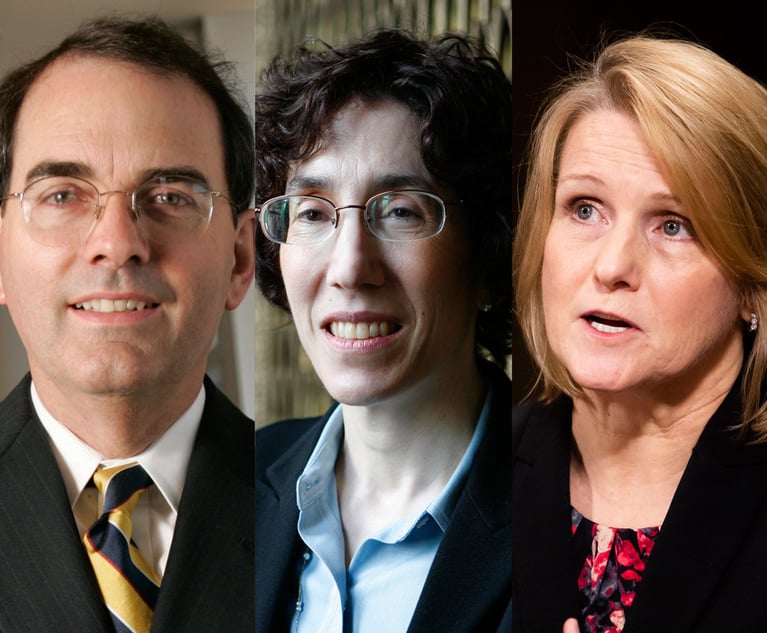 Jenner & Block offices in Washington, D.C. (Photot: Diego M. Radzinschi / ALM)
Jenner & Block offices in Washington, D.C. (Photot: Diego M. Radzinschi / ALM)Jenner's Adam Unikowsky Extends SCOTUS Winning Streak to 8
In a recent article in The Journal of Appellate Practice and Process, the Jenner appellate partner reminisced about his first Supreme Court argument and offered observations about oral advocacy.
March 22, 2019 at 01:58 PM
3 minute read
Jenner & Block partner Adam Unikowsky has done it again.
The Supreme Court on Tuesday handed him a win in Washington State Department of Licensing v. Cougar Den Inc. That marks the eighth straight Supreme Court victory for Unikowsky, who only began arguing cases at the high court three years ago.
It was a splintered decision but a win in an Indian tax case for Unikowsky's client, a fuel company owned by the Yakama Nation in Washington state. Asked how he felt about his streak, he replied, “I'll just say this: I'm very pleased by the Supreme Court's decision and believe that its interpretation of the 1855 [Yakama] treaty is correct.”
Unikowsky burst onto the scene in 2016 with a run of winning arguments, beginning with Puerto Rico v. Valle, a double jeopardy case. He has won all of his seven argued cases, as well as another case that was a summary reversal.
How did he do it? In a recent article in The Journal of Appellate Practice and Process, Unikowsky reminisced about his first argument and offered observations about oral advocacy:
 Adam Unikowsky
Adam Unikowsky>> “I prepared obsessively for the oral argument, doing three moot courts and spending most of my waking hours figuring out how I would respond to off-the-wall questions. The oral argument itself was a blur.”
>> “As in many a Supreme Court argument, my experience consisted of listening nervously to often lengthy questions that I wasn't sure I understood, stammering out a few words in response and then being interrupted with another lengthy question.”
>> “In Howell v. Howell, I sat down with something like 13 minutes left, having gotten only a few polite questions from the bench. In Honeycutt v. United States, I don't think I got a single hostile question,and sat down 15 minutes early. My primary regret in both cases was that I droned on too long in rebuttal.”
>> “I have always found it unseemly for lawyers to take too much credit for Supreme Court wins. Supreme Court litigation is not a moot court competition. The Supreme Court rules for the better case, not the better lawyer.”
>> “Of course having a good lawyer helps convince the court about the strength of a case, but the Justices do try their best to look past the quality of the lawyering and get to the right answer.”
>> “I definitely didn't win the cases because of my oral arguments. My clients won the cases because, on the law, they deserved to win. I just went along for the ride, but it was a great ride.”
Read more:
This content has been archived. It is available through our partners, LexisNexis® and Bloomberg Law.
To view this content, please continue to their sites.
Not a Lexis Subscriber?
Subscribe Now
Not a Bloomberg Law Subscriber?
Subscribe Now
NOT FOR REPRINT
© 2024 ALM Global, LLC, All Rights Reserved. Request academic re-use from www.copyright.com. All other uses, submit a request to [email protected]. For more information visit Asset & Logo Licensing.
You Might Like
View All
Divided 5th Circuit Shoots Down Nasdaq Diversity Rules

Nevada Supreme Court to Decide Fate of Groundbreaking Contingency Cap Ballot Measure
5 minute read
Lawyers, Law Groups Oppose Proposal to Require Court Approval for Amicus Briefs

9th Circuit Judges Weigh if Section 230 Shields Grindr From Defective Design Claims
Trending Stories
- 1Senate Confirms Last 2 of Biden's California Judicial Nominees
- 2Morrison & Foerster Doles Out Year-End and Special Bonuses, Raises Base Compensation for Associates
- 3Tom Girardi to Surrender to Federal Authorities on Jan. 7
- 4Husch Blackwell, Foley Among Law Firms Opening Southeast Offices This Year
- 5In Lawsuit, Ex-Google Employee Says Company’s Layoffs Targeted Parents and Others on Leave
Who Got The Work
Michael G. Bongiorno, Andrew Scott Dulberg and Elizabeth E. Driscoll from Wilmer Cutler Pickering Hale and Dorr have stepped in to represent Symbotic Inc., an A.I.-enabled technology platform that focuses on increasing supply chain efficiency, and other defendants in a pending shareholder derivative lawsuit. The case, filed Oct. 2 in Massachusetts District Court by the Brown Law Firm on behalf of Stephen Austen, accuses certain officers and directors of misleading investors in regard to Symbotic's potential for margin growth by failing to disclose that the company was not equipped to timely deploy its systems or manage expenses through project delays. The case, assigned to U.S. District Judge Nathaniel M. Gorton, is 1:24-cv-12522, Austen v. Cohen et al.
Who Got The Work
Edmund Polubinski and Marie Killmond of Davis Polk & Wardwell have entered appearances for data platform software development company MongoDB and other defendants in a pending shareholder derivative lawsuit. The action, filed Oct. 7 in New York Southern District Court by the Brown Law Firm, accuses the company's directors and/or officers of falsely expressing confidence in the company’s restructuring of its sales incentive plan and downplaying the severity of decreases in its upfront commitments. The case is 1:24-cv-07594, Roy v. Ittycheria et al.
Who Got The Work
Amy O. Bruchs and Kurt F. Ellison of Michael Best & Friedrich have entered appearances for Epic Systems Corp. in a pending employment discrimination lawsuit. The suit was filed Sept. 7 in Wisconsin Western District Court by Levine Eisberner LLC and Siri & Glimstad on behalf of a project manager who claims that he was wrongfully terminated after applying for a religious exemption to the defendant's COVID-19 vaccine mandate. The case, assigned to U.S. Magistrate Judge Anita Marie Boor, is 3:24-cv-00630, Secker, Nathan v. Epic Systems Corporation.
Who Got The Work
David X. Sullivan, Thomas J. Finn and Gregory A. Hall from McCarter & English have entered appearances for Sunrun Installation Services in a pending civil rights lawsuit. The complaint was filed Sept. 4 in Connecticut District Court by attorney Robert M. Berke on behalf of former employee George Edward Steins, who was arrested and charged with employing an unregistered home improvement salesperson. The complaint alleges that had Sunrun informed the Connecticut Department of Consumer Protection that the plaintiff's employment had ended in 2017 and that he no longer held Sunrun's home improvement contractor license, he would not have been hit with charges, which were dismissed in May 2024. The case, assigned to U.S. District Judge Jeffrey A. Meyer, is 3:24-cv-01423, Steins v. Sunrun, Inc. et al.
Who Got The Work
Greenberg Traurig shareholder Joshua L. Raskin has entered an appearance for boohoo.com UK Ltd. in a pending patent infringement lawsuit. The suit, filed Sept. 3 in Texas Eastern District Court by Rozier Hardt McDonough on behalf of Alto Dynamics, asserts five patents related to an online shopping platform. The case, assigned to U.S. District Judge Rodney Gilstrap, is 2:24-cv-00719, Alto Dynamics, LLC v. boohoo.com UK Limited.
Featured Firms
Law Offices of Gary Martin Hays & Associates, P.C.
(470) 294-1674
Law Offices of Mark E. Salomone
(857) 444-6468
Smith & Hassler
(713) 739-1250










